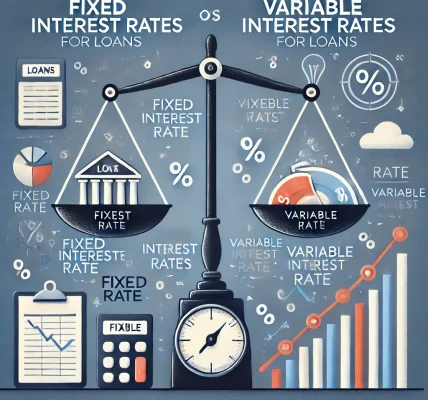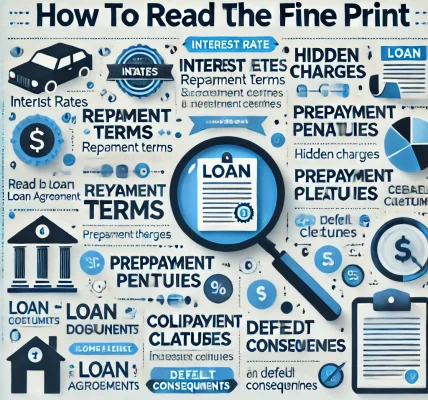Introduction
Loan agreements are essential financial tools that help individuals and businesses secure necessary funding. However, many borrowers fail to read the fine print, leading to unexpected costs and legal complications. Hidden clauses in loan policies can significantly impact repayment terms, interest rates, penalties, and borrower obligations. Understanding these hidden clauses ensures that you make informed financial decisions and avoid costly surprises.
This comprehensive guide highlights the common hidden clauses in loan policies, how they affect borrowers, and what you can do to protect yourself.
Common Hidden Clauses in Loan Agreements
1. Prepayment Penalty
Many lenders charge borrowers a prepayment penalty if they repay their loans before the agreed-upon term. This clause is designed to compensate lenders for lost interest revenue.
How it Affects Borrowers:
- If you plan to clear your debt early, you may end up paying extra fees.
- Some lenders impose steep penalties, making early repayment financially disadvantageous.
What to Do:
- Look for loans that do not have prepayment penalties or negotiate lower fees.
- Carefully read the loan agreement before signing.
2. Variable Interest Rate Clause
Some loans come with a variable interest rate, meaning the interest rate may increase over time based on market conditions.
How it Affects Borrowers:
- Monthly payments can fluctuate, making it difficult to budget.
- Higher interest rates increase the overall cost of borrowing.
What to Do:
- Opt for fixed-rate loans if you prefer stable monthly payments.
- If choosing a variable-rate loan, understand the rate adjustment mechanism and frequency.
3. Balloon Payment Clause
A balloon payment is a large lump sum that a borrower must pay at the end of a loan term. This clause is common in mortgages and auto loans.
How it Affects Borrowers:
- Monthly payments may be lower initially, but the final payment can be a financial burden.
- Borrowers who cannot afford the balloon payment may need to refinance or risk default.
What to Do:
- Ask the lender if the loan includes a balloon payment.
- Plan ahead to ensure you can meet the final payment obligation.
4. Cross-Default Clause
A cross-default clause states that if a borrower defaults on one loan, it automatically triggers default on other loans held with the same lender.
How it Affects Borrowers:
- A default on one loan can cause a chain reaction, putting multiple loans at risk.
- Borrowers may face immediate repayment demands or legal actions.
What to Do:
- Be cautious when taking multiple loans from the same lender.
- Ensure you have a stable financial plan to avoid defaults.
5. Loan Recapitalization Clause
This clause allows lenders to increase the loan principal amount by adding unpaid interest and fees into the outstanding balance.
How it Affects Borrowers:
- Borrowers end up paying interest on a higher amount than they initially borrowed.
- Can result in higher monthly payments and a longer loan term.
What to Do:
- Read the loan agreement carefully for any mention of recapitalization.
- Avoid loans with this clause or negotiate better terms.
6. Acceleration Clause
An acceleration clause gives the lender the right to demand full repayment if the borrower breaches any terms of the loan agreement.
How it Affects Borrowers:
- Missing a single payment or violating a minor loan condition can result in the lender demanding full repayment.
- Can lead to foreclosure or repossession in secured loans.
What to Do:
- Understand all obligations in the loan agreement and comply with them.
- Negotiate with the lender if you face temporary financial difficulties.
7. Force Majeure Clause
A force majeure clause allows the lender to alter loan terms in case of unforeseen events, such as economic crises or regulatory changes.
How it Affects Borrowers:
- Lenders may increase interest rates or impose stricter repayment conditions during crises.
- Borrowers may have limited recourse to challenge changes.
What to Do:
- Clarify under what conditions the lender can modify loan terms.
- Consider legal counsel before signing an agreement with this clause.
8. Hidden Fees & Charges
Lenders sometimes include hidden fees that borrowers are unaware of until they start making payments. These can include:
- Origination fees (charged when issuing a loan)
- Processing fees
- Late payment penalties
- Annual maintenance fees
How it Affects Borrowers:
- Increases the total cost of borrowing.
- Some fees may not be explicitly mentioned upfront.
What to Do:
- Request a full breakdown of fees before signing any loan agreement.
- Compare loan offers from multiple lenders to find the most transparent option.
How to Protect Yourself from Hidden Clauses
1. Read the Loan Agreement Carefully
Always read the entire loan document, including the fine print. Look out for terms that could affect your repayment ability.
2. Ask Questions
If any clause seems unclear, ask your lender for clarification. Never assume that all terms are standard.
3. Compare Multiple Loan Offers
Different lenders have different policies. Compare loans from various banks, credit unions, and online lenders to find the best terms.
4. Seek Legal Advice
For large loans (e.g., mortgages or business loans), consider consulting a financial advisor or lawyer to review the contract before signing.
5. Maintain a Good Credit Score
A strong credit history can help you qualify for loans with better terms and fewer hidden clauses.
Conclusion
Hidden clauses in loan policies can have serious financial implications if not carefully reviewed. By understanding and identifying these clauses, borrowers can protect themselves from unexpected fees, penalties, and unfavorable loan modifications. Always take the time to read loan agreements, ask questions, and compare lenders to ensure you make the best borrowing decisions.



